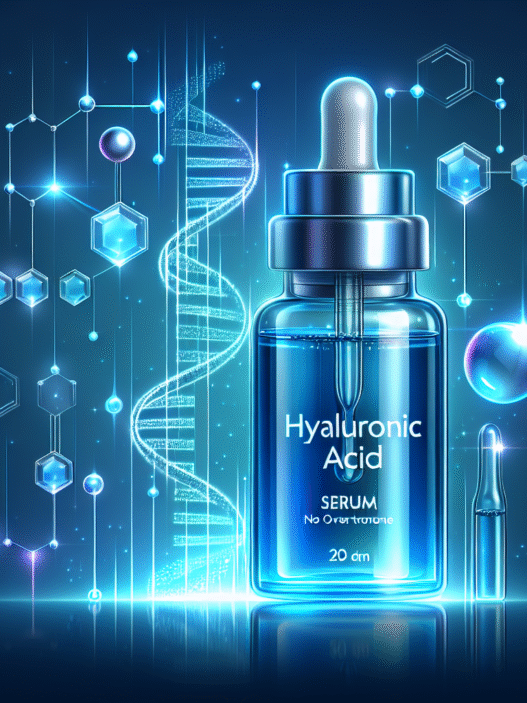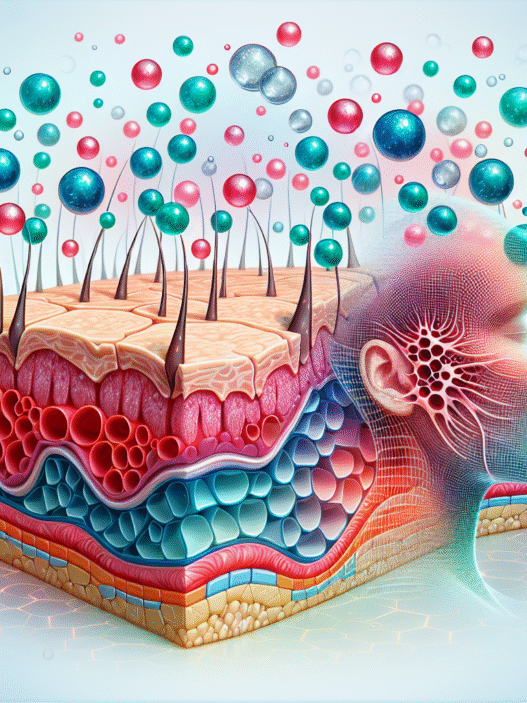Understanding Hyaluronic Acid
Hyaluronic acid is a naturally occurring substance found in the human body, playing a vital role in various physiological processes. This section explores its natural production, sources, and functions within the body.
Natural Production and Sources
Hyaluronic acid is synthesized by the body, primarily through the fermentation of certain types of bacteria and can also be sourced from rooster combs (Cleveland Clinic). It is abundantly found in several parts of the body, including the skin, eyes, and joints, where it helps maintain hydration and overall health. The following table showcases some of the primary sources of hyaluronic acid:
| Source | Description |
|---|---|
| Skin | Maintains skin moisture and elasticity |
| Eyes | Helps to maintain eye hydration |
| Joints | Cushions and lubricates joint movement |
| Bacteria | Fermented sources for supplementation |
| Rooster Combs | Natural source used in supplements |
Functions in the Body
Hyaluronic acid serves multiple crucial functions within the body. Its unique properties allow it to bind water molecules, providing hydration and support to various tissues. Some key functions include:
- Tissue Hydration: It holds water up to 1,000 times its weight, ensuring that tissues remain hydrated and plump.
- Wound Healing: Hyaluronic acid acts as a scaffold structure, allowing tissues to grow and facilitating wound healing processes (Cleveland Clinic).
- Cell Attachment: It has the ability to attach itself to cells, playing a vital role in targeted delivery of medications, which is an active area of scientific research.
Understanding the natural production and functions of hyaluronic acid is essential for recognizing its benefits, especially when combined with collagen for maintaining skin elasticity and overall vitality. For more information on the benefits of hyaluronic acid, refer to our article on hyaluronic acid benefits and discover how it enhances skincare routines.
Benefits of Hyaluronic Acid
Hyaluronic acid is celebrated for its multiple health benefits, particularly concerning skin, joints, and eyes. Understanding these can help enthusiasts appreciate its relevance in beauty and skincare routines.
Skin Health and Elasticity
Hyaluronic acid plays a vital role in maintaining skin health and elasticity. It is a humectant, which means it draws moisture from the environment into the skin, helping to keep it hydrated and plump. This hydration is crucial for maintaining skin elasticity and can diminish the appearance of wrinkles and fine lines.
According to studies, the presence of hyaluronic acid can lead to:
| Benefit | Description |
|---|---|
| Improved Hydration | Retains moisture, making skin appear more supple and refreshed. |
| Enhanced Elasticity | Encourages skin firmness, supporting overall elasticity. |
| Reduction of Wrinkles | Helps soften the appearance of fine lines and deep wrinkles. |
Hyaluronic acid is effectively used in various hyaluronic acid serums, creams, and other skincare products to enhance moisture levels in the skin. It is widely regarded as an effective ingredient for preventing the signs of aging, promoting a more youthful appearance through its anti-aging properties.
Joint and Eye Health
Aside from its skincare perks, hyaluronic acid offers significant benefits for joint and eye health. It is naturally found in the synovial fluid that lubricates joints, reducing friction and preventing wear on cartilage. This quality makes it beneficial for individuals suffering from joint issues, as it helps maintain joint function and alleviates discomfort.
For eye health, hyaluronic acid is a primary component of the vitreous humor, the gel-like substance that fills the eye. It assists in retaining moisture and maintaining the eye’s structure, which is essential for proper vision.
The benefits of hyaluronic acid for joint and eye health can be summarized as follows:
| Area | Benefit |
|---|---|
| Joints | Provides lubrication, reduces stiffness, and promotes mobility. |
| Eyes | Maintains moisture and structural integrity of the eye, ensuring optimal vision. |
Hyaluronic acid is often administered through hyaluronic acid injections for joint conditions, and it can also be found in various eye care products to help with dryness and discomfort. The versatility of hyaluronic acid makes it an essential element in health and beauty routines aimed at overall well-being. For additional insights on skin hydration and rejuvenation, explore hyaluronic acid for skin and its role in anti-wrinkle treatments.
Safety and Usage of Hyaluronic Acid
When incorporating hyaluronic acid into beauty routines, understanding its safety and usage is essential. It is available in various forms, including over-the-counter products, prescription-based options, and injections.
Over-the-Counter Products
Over-the-counter hyaluronic acid products, such as serums, creams, and moisturizers, are considered safe for use. Many individuals use these products to enhance skin hydration and elasticity Cleveland Clinic. Topical hyaluronic acid is generally well-tolerated, with few reported allergic reactions. It is also safe for pregnant and breastfeeding individuals, making it a popular choice for maintaining healthy skin during those times (Harvard Health Publishing).
Common over-the-counter hyaluronic acid products may include:
| Product Type | Description |
|---|---|
| Serums | Concentrated formulas that penetrate deeply for hydration. |
| Creams | Thicker formulations providing moisture and skin barrier support. |
| Lotions | Lightweight options suitable for everyday use. |
| Eye Care Products | Targets dryness and puffiness around the eyes. |
| Supplements | Oral treatments that may support skin hydration. |
These products should be applied as directed for optimal results. For those interested in increasing hydration, exploring options like hyaluronic acid serums or hyaluronic acid creams can be beneficial.
Prescription Products and Injections
Prescription-based hyaluronic acid treatments, particularly injections, require careful usage. These should only be administered by licensed medical professionals to ensure safety and effectiveness. While these products can provide significant benefits, including treating joint pain and skin volume loss, they should be used precisely as directed by a healthcare provider Cleveland Clinic.
Injectable treatments offer quick hydration and plumping effects, making them an attractive option for individuals seeking immediate results. It is essential to discuss potential risks and benefits with a healthcare professional before proceeding with injections.
For those considering injectable treatments, it’s important to get familiar with options like hyaluronic acid injections. Additionally, always follow any professional recommendations and guidelines to achieve the desired outcomes safely.
Hyaluronic Acid in Skincare
Long-Term Skin Benefits
The long-term use of hyaluronic acid (HA) serum—whether applied topically or taken as an oral supplement—can significantly enhance overall skin health. Regular use can improve skin flexibility and elasticity, making it not only more supple but also softer (Cleveland Clinic). For individuals with dry skin, especially during colder months, topical applications of hyaluronic acid are beneficial in increasing moisture retention.
| Benefit | Description |
|---|---|
| Enhanced Skin Hydration | Helps maintain optimal moisture levels, keeping the skin hydrated and plump. |
| Improved Skin Elasticity | Increases the skin’s flexibility, making it more resilient to stress. |
| Softer Skin Texture | Contributes to a smoother, softer feel due to improved moisture content. |
Hyaluronic Acid Fillers
While topical HA can be excellent for moisturizing the skin, it does not replace the volume lost due to aging as effectively as injectable fillers. Injectable hyaluronic acid is more effective for addressing volume loss and sagging skin. These fillers can restore contours, reduce wrinkles, and provide a more youthful appearance (Harvard Health Publishing).
Factors that influence the effectiveness of injectable HA fillers include:
| Feature | Description |
|---|---|
| Application Technique | Skilled application can lead to more natural and uniform results. |
| Product Formulation | Different types of HA fillers can be used, depending on the desired effect (softness or firmness). |
| Longevity of Results | Results typically last from 6 months to 2 years, depending on the formulation and area treated. |
For individuals looking to enhance their skin regimen with hyaluronic acid, various products containing this powerful ingredient are available, including hyaluronic acid serum, hyaluronic acid moisturizer, and hyaluronic acid injections. Each option provides different benefits and can be tailored to individual skincare needs. Discover more about the benefits of hyaluronic acid in our detailed guide on hyaluronic acid benefits.
Hyaluronic Acid and Collagen Connection
Skin Aging Effects
As individuals age, both hyaluronic acid and collagen play vital roles in maintaining skin health. They are fundamental building blocks of the skin; collagen provides structure and support, while hyaluronic acid keeps the skin hydrated (Galderma Aesthetics). With advancing age, the levels of both these substances decrease due to natural aging and external factors, such as UV exposure and inflammation. The decline leads to visible signs of aging, including thinner, sagging skin that appears dry and less supple.
The impact of this reduction can be substantial. A study examining dietary supplementation highlighted that, while collagen has benefits for skin density and texture, there were no significant changes in skin elasticity or hydration from just collagen alone or in combination with hyaluronic acid (PubMed). This suggests that aging affects the skin’s ability to retain moisture and structure, requiring increased attention to both hyaluronic acid and collagen.
| Age Group | Expected Hyaluronic Acid & Collagen Levels | Skin Appearance |
|---|---|---|
| 20s | High | Firm, hydrated, and smooth |
| 30s | Moderate | Beginning to show slight signs of aging |
| 40s | Decreasing | Thinner, loss of elasticity, and dryness |
| 50s and above | Low | Noticeable sagging, wrinkles, dry texture |
Effects of Aging on Skin
The effects of aging on the skin are multifaceted. With decreased levels of hyaluronic acid, skin hydration declines, leading to increased dryness. Collagen depletion affects the skin’s firmness, resulting in sagging and the formation of wrinkles. As per findings from various studies, hyaluronic acid’s performance in hydrating the skin makes it a popular ingredient in products aimed at combating signs of aging (Cleveland Clinic).
The combined influence of reduced hyaluronic acid and collagen levels can make skin appear dull and less youthful. Hydration is crucial, as it helps maintain skin elasticity and resilience against environmental factors. Therefore, incorporating products rich in both hyaluronic acid and collagen is essential, especially for those concerned with hyaluronic acid and collagen in their anti-aging regimen.
To help mitigate the signs of aging, many beauty enthusiasts opt for hyaluronic acid serums, moisturizers, and hyaluronic acid injections to boost hydration and promote a more youthful appearance. Understanding the relationship between these two vital components provides insights into effective skincare strategies for maintaining skin health over time.
Enhancing Skin with Hyaluronic Acid
Injectable treatments and professional recommendations are two ways to leverage the benefits of hyaluronic acid in skincare. Understanding these options can help individuals achieve more youthful, hydrated skin.
Injectable Treatments
Injectable treatments provide a direct method for enhancing skin through hyaluronic acid. Dermal fillers containing hyaluronic acid, such as Restylane® SKINBOOSTERS™, focus on increasing skin hydration and elasticity. These injections help to deliver stabilized hyaluronic acid directly into the skin, yielding immediate results in terms of skin plumpness and moisture retention.
Another option is Sculptra®, which works differently by stimulating the skin’s natural collagen production through the injection of poly-L-lactic acid (PLLA) microspheres. Over time, Sculptra® can increase skin collagen content by up to 66.5%, with effects lasting up to 25 months (Galderma Aesthetics).
| Treatment Type | Main Action | Duration of Results |
|---|---|---|
| Restylane® SKINBOOSTERS™ | Increases hydration and elasticity | Immediate |
| Sculptra® | Stimulates collagen production | Up to 25 months |
Injectable hyaluronic acid not only adds volume but also draws water to the area, which enhances the filling effect. This method can address various cosmetic concerns, such as lifting cheeks and softening creases, with results that are often more pronounced than those from topical products.
Professional Recommendations
Consulting with a skincare professional can provide insights into the best ways to incorporate hyaluronic acid into a skincare routine. A dermatologist or licensed aesthetician can help assess individual skin needs and recommend suitable products or treatments.
In addition to injectable treatments, professionals may suggest in-office procedures or specific hyaluronic acid serum options that suit different skin types. They may also recommend complementary products, such as hyaluronic acid moisturizer or hyaluronic acid cream, for at-home use to enhance hydration and support overall skin health.
For those considering a combination approach, utilizing both injectables and topical products can maximize the benefits of hyaluronic acid and collagen in achieving youthful and hydrated skin. Professionals can also educate clients about the importance of consistency in their skincare routines, ensuring they maximize the long-term benefits of hyaluronic acid in combating the signs of aging.
Overall, enhancing skin with hyaluronic acid involves a thoughtful combination of professional treatments and daily skincare practices to foster a more youthful and hydrated appearance.





















